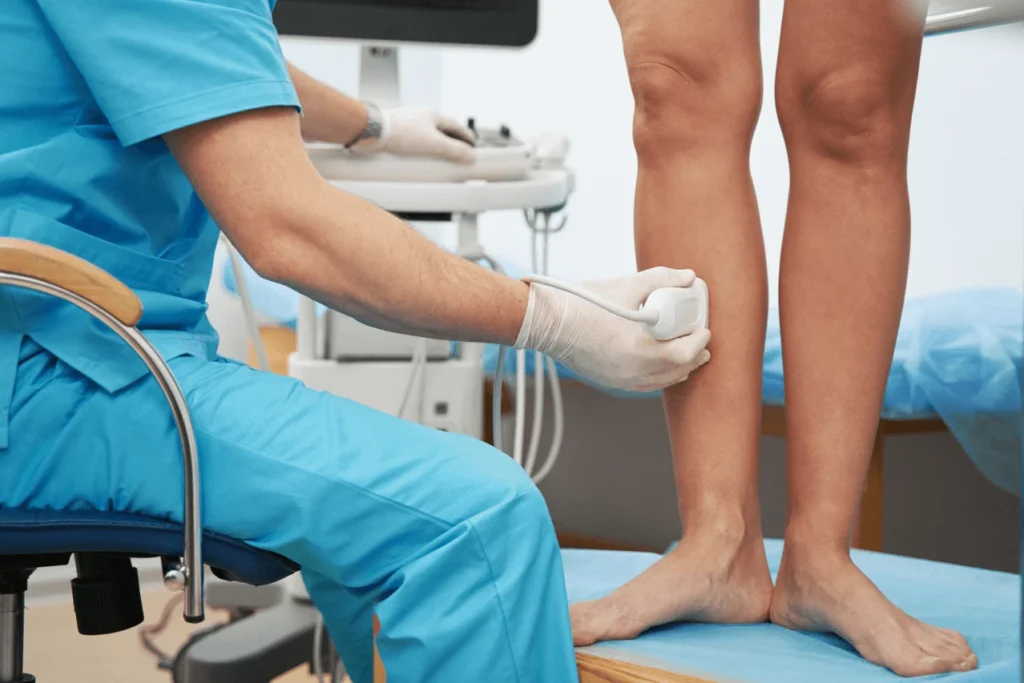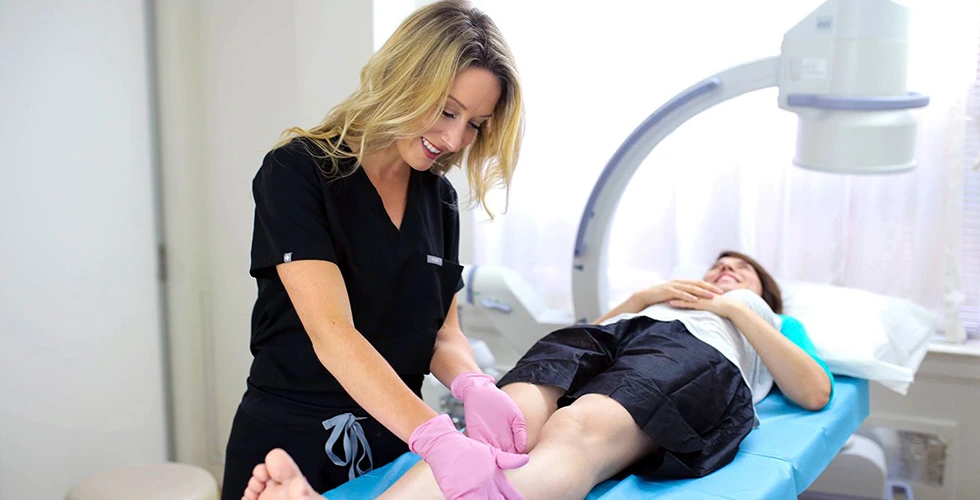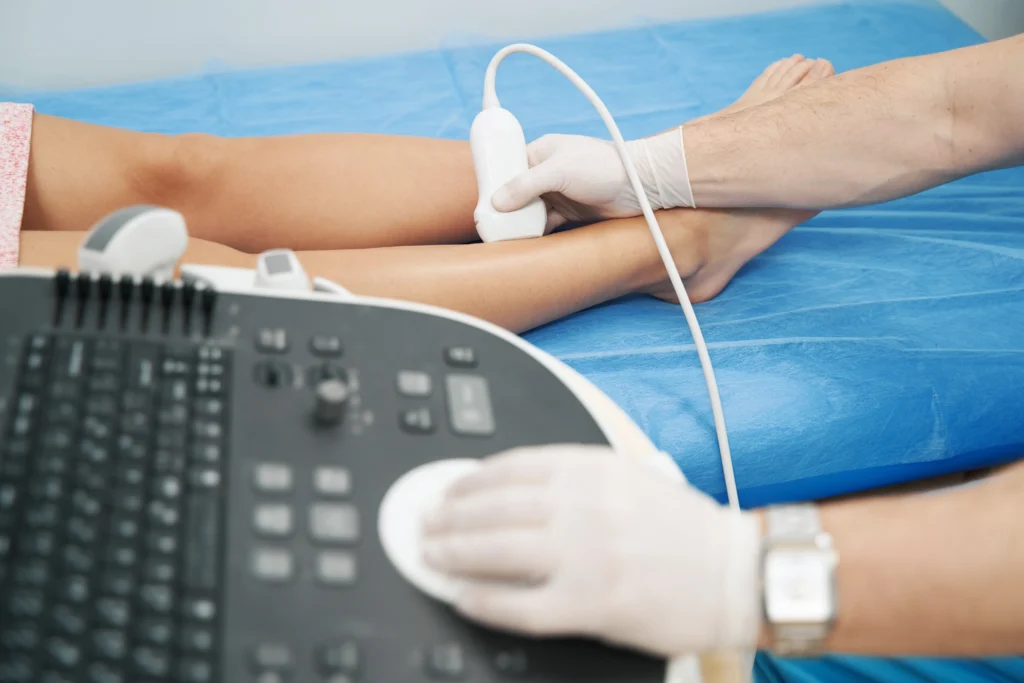If you’re dealing with varicose veins or spider veins, you’re probably wondering what kind of doctor you should see. The answer is a vein specialist, also known as a vascular doctor or a phlebologist. These doctors specialize in diagnosing and treating conditions that affect the circulatory system, particularly the blood vessels in the legs.
At Maryland Vein Clinic, we have board-certified vein doctors who are experts in minimally invasive treatments for spider veins and varicose veins. Here’s what you need to know about seeing a vein specialist and how we can help.
What Is a Vein Specialist?
A vein specialist is a doctor who has completed specialized training in the diagnosis and treatment of venous disorders. This includes conditions such as varicose veins, spider veins, deep vein thrombosis, and chronic venous insufficiency. Vein specialists may be cardiologists, radiologists, or surgeons who have completed additional training in phlebology.
At Maryland Vein Clinic, our vein specialists are board-certified and have years of experience in treating venous disorders. We use the latest diagnostic tools and minimally invasive treatments to provide our patients with the best possible care.

Why See a Vein Specialist?
If you have varicose veins or spider veins, you may be tempted to try home remedies or over-the-counter treatments before seeing a doctor. However, it’s important to see a vein specialist for an accurate diagnosis and personalized treatment plan.
Varicose veins and spider veins can be symptoms of underlying venous disease. A vein specialist will perform a thorough evaluation to determine the root cause of your condition and develop a treatment plan tailored to your specific needs. Without proper diagnosis and treatment, your venous disorder may worsen and cause complications.
What Does a Vein Specialist Do?
When you visit a vein specialist, you can expect a comprehensive evaluation that includes a medical history, physical exam, and diagnostic testing. At Maryland Vein Clinic, we use vascular imaging and duplex ultrasound to assess the health of your veins and determine the best course of treatment. Based on your diagnosis, your vein specialist will recommend the most appropriate treatment options.
At Maryland Vein Clinic, we specialize in minimally invasive treatments that require little to no downtime. The following are some of the minimally invasive vein treatments we offer:
- Sclerotherapy: A minimally invasive treatment that involves injecting a solution into the affected veins to close them off and reroute blood flow to healthy veins.
- Endovenous Laser Ablation: A minimally invasive treatment that uses laser energy to heat and close off varicose veins.
- Radiofrequency Ablation: A minimally invasive treatment that uses radiofrequency energy to heat and close off varicose veins.
- VenaSeal: A minimally invasive treatment that uses a medical adhesive to seal off varicose veins.
- ClariVein: A minimally invasive treatment that combines mechanical agitation and chemical solution to close off varicose veins.
- Ambulatory Phlebectomy: A minimally invasive treatment that involves removing varicose veins through small incisions in the skin.
All of these treatments are performed on an outpatient basis and allow you to return to your normal activities immediately. Your vein specialist will work with you to determine the best treatment plan for your specific needs and lifestyle.
How to Prevent Varicose Veins and Spider Veins
While some risk factors for venous disease, such as age and genetics, are beyond your control, there are steps you can take to minimize the risk of varicose and spider veins. These include:
- Maintaining a healthy weight
- Staying active
- Wearing compression stockings
- Avoiding prolonged periods of sitting or standing
- Elevating your legs when resting
- Avoiding tight clothing
How to Take Care of Your Veins
Taking care of your veins is an important part of maintaining overall vein health. In addition to following the preventative steps listed above, there are several other things you can do to support healthy veins. These include:
- Eating a healthy, balanced diet that’s rich in fiber and low in salt
- Drinking plenty of water to stay hydrated
- Avoiding smoking or using tobacco products
- Getting regular exercise to promote healthy blood flow
- Taking breaks and moving around frequently during long periods of sitting or standing
The Importance of Board Certification
When choosing a vein specialist, it’s important to look for a doctor who is board-certified in phlebology or vascular surgery. Board certification indicates that the doctor has completed rigorous training and has passed a comprehensive exam in their specialty. At Maryland Vein Clinic, all of our vein specialists are board-certified and have years of experience in treating venous disorders. We are committed to providing our patients with the highest level of care and the best possible outcomes.
Where to Find a Vein Specialist
If you’re in the Maryland area and looking for a vein specialist, Maryland Vein Clinic is here to help. Our vein clinics are conveniently located in Silver Spring, Maryland, just outside of Washington, DC. Our state-of-the-art facilities are designed to provide a comfortable, welcoming environment for our patients. We use the latest diagnostic tools and minimally invasive treatments to ensure the best possible outcomes for our patients.
At Maryland Vein Clinic, we offer minimally invasive treatments and personalized care to help you achieve healthy, beautiful legs. Contact us today to schedule a consultation and learn more about our services. We offer free insurance verification even before the first appointment, so you can be confident that you’re making the right choice for your vein health. With our expert care and state-of-the-art treatments, you can enjoy smoother, more comfortable legs in no time.





